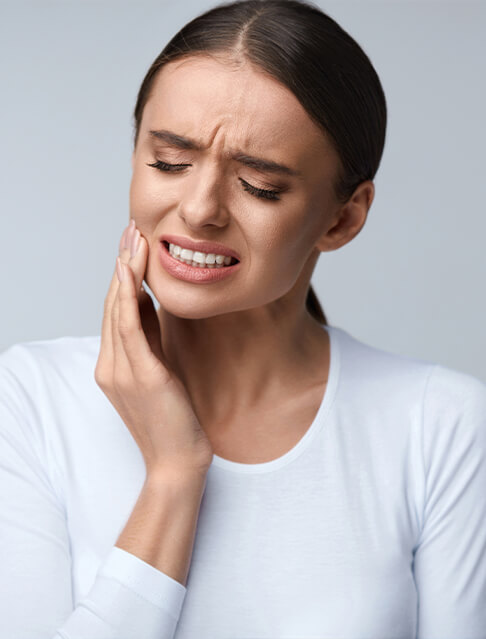

Our team at Sweet Smiles Family Dentistry & Orthodontics never wants to leave a patient in pain or discomfort, which is why we provide emergency appointments whenever possible. If you have a toothache, something lodged between your teeth, or are dealing with any out-of-the-ordinary symptoms, don’t hesitate to call our team immediately. We’ll provide you with over-the-phone first-aid guidance as well as fast and effective emergency dentistry in our Marana, AZ dental office.

Handling dental emergencies can be difficult, especially when you’re in shock and can’t think clearly. Fortunately, our experienced dental staff as well as Dr. Alison Fitzgerald are here to help you get out of pain quickly, all while minimizing any damage to your smile. We’ve also included some helpful information below on how to handle the most common dental emergencies to relieve some of your discomfort until you get to our dental office.
Use the Arrows to Explore Our Services


The cost of your dental emergency visit will depend on a couple of key factors, including what the issue at-hand is and what treatment option you go with to provide you with lasting relief. Dr. Fitzgerald always takes the time to walk you through your options so you can make the best decision for your smile, and our team is more than happy to assist with any financial questions. We offer an in-house financing plan to make treatment affordable for patients, and we accept dental insurance as well.
When determining the cost of your dental emergency, we must first determine what type of injury has occurred and the best way to approach it. Generally, if you only require antibiotics or another prescribed medication, the cost of your treatment will be lower. However, if you are needing a more complex treatment, like a dental crown or root canal, you will be looking at a higher cost. Until you see us, there is no way of knowing how much you will pay to restore your smile to health.
Most of the time, dental insurance providers agree to cover emergency dental services. How much they cover is based on the type of restorative treatment you need. Some companies will pay at least 50% of the total cost, but you need to contact your insurer to find out the specific details of your plan. We are in-network with numerous popular insurance plants, but we also welcome out-of-network plans.
If you don’t have dental insurance, this doesn’t mean that you will be left completely on your own. We work with CareCredit – a third-party financing company that can split the cost of your treatment into manageable monthly installments with little to no interest. To learn more about your financial options, talk to one of our friendly team members.
Not all dental emergencies are preventable, but when you implement an excellent oral hygiene routine and eliminate bad habits, like crunching on ice and smoking, you can reduce your probability of experiencing one. You should also keep an eye out for changes in your mouth. Even something minor, like a toothache, can become a much larger issue without treatment. It is possible that smaller dental emergencies can be resolved with less costly solutions if treated right away. Ultimately, by receiving regular preventive care and addressing changes in your mouth immediately, you can save hundreds or even thousands of dollars.

It isn’t always possible to prevent all dental emergencies from occurring. However, there are some precautionary measures that you can take to drastically reduce your risk of ending up in your emergency dentist’s treatment chair. Additionally, several unhealthy habits can significantly increase your chances of experiencing severe oral health problems that will require urgent care. To protect your smile in the long run, here are five essential ways to prevent dental emergencies in Marana!
Scheduling regular dental checkups and cleanings every six months is one of the most important ways to keep your teeth strong, healthy, and safe. Not only will Dr. Fitzgerald thoroughly polish your smile to remove any stubborn plaque and tartar, but she’ll also monitor your oral health. During your appointment, she’ll check your teeth, gums, tongue, jaw, and other oral tissues and provide treatment for any developing issues she might find, such as cavities and gum disease, before they can worsen over time. You’ll also receive personalized care to help prevent serious oral health problems from starting altogether.
Aside from your visits to your dentist, you’ll need to keep your teeth clean daily. Make sure to brush your teeth for two minutes twice a day, using a soft-bristled toothbrush to prevent wearing down your enamel. You should also floss at least once daily or after every meal to remove debris, plaque, and bacteria from the areas your toothbrush won’t be able to reach. Rinse with non-alcoholic mouthwash frequently to help preserve healthy gums and keep your breath fresh.
Your diet plays an incredibly essential role in maintaining a strong and healthy smile. While everyone knows that sugar can cause cavities, foods that are packed with carbohydrates and starches can also add fuel to bacteria growth in your mouth. You’ll want to avoid overindulging on sports drinks, energy drinks, and even fruit juices, which are highly acidic and can weaken your enamel dramatically. Try sticking to meals that are loaded with calcium and fiber to strengthen your pearly whites and reduce your risk of tooth decay.
Do you tend to play contact sports where there’s a chance that you can get hit in the face? If so, you may want to ask about wearing athletic mouthguards that can protect your teeth from sudden impacts. Our dental team will be able to assess your oral situation and recommend the best products that can address your specific smile. We can also provide you with custom-made nightguards for bruxism, which are beneficial for patients who tend to grind or clench their teeth in their sleep. With these dental appliances, you won’t have to worry about gradually wearing down and weakening your enamel.
The last thing you’d want is to need emergency dentistry after trying to open a package with your teeth. While this might seem convenient or save you a few seconds, doing so can place you at risk of accidentally chipping, cracking, or breaking your pearly whites. To avoid requiring urgent dental care, you should never use your teeth to open containers (like a bottle or box), bite your fingernails, or even hold grocery bags. Instead, make sure you have scissors, bottle openers, and other handy tools nearby to prevent the temptation to put your smile in danger of a dental emergency.
If you knock out a tooth, there are two things you need to do: schedule an emergency appointment at our Marana dental office and protect your tooth from further harm. When it comes to the latter, you should either place it back in its socket or in a clean container filled with milk, NOT water. This is important because water can actually damage the root surface cells, lowering the chances of us being able to save your tooth.
If your toothache disappears, you might assume that you’re free to cancel your appointment or continue taking the “wait and see” approach. The reality is that the change in symptoms is usually because the nerve inside the tooth has died due to an infection. Since the infection can spread throughout your mouth and body, it’s of the utmost importance that you call us right away to schedule an emergency visit.
A few common symptoms of an infection are a bitter taste in your mouth, chronic bad breath, persistent throbbing, and swollen gums. That said, we recommend scheduling an appointment with us if any warning signs of trouble surface. The sooner you get in touch with us, the sooner we can determine if an infection is the root of the problem and, if it is, the best way to eliminate it.
Even if the chip is relatively minor and you aren’t in pain, we do recommend scheduling an exam. There are a few reasons for this, including the fact that the tooth is likely at risk of breaking further. We want to restore the missing structure before that happens!
Chronic bad breath could be due to your diet or an untreated dental problem. For that reason, we strongly recommend avoiding pungent foods, like pickled onions, and prioritizing your oral hygiene regimen. If the odor persists, then call us to schedule an appointment. Once we have a chance to learn more about your symptoms and complete a comprehensive exam, we can determine the best way to proceed.
Patients are often tempted to reach for something sharp when they get something stuck between their teeth. However, even something as seemingly harmless as a toothpick can push the debris further into position and irritate your gums. For those reasons, we recommend taking a different approach: rinsing your mouth with warm saltwater before gently flossing between your teeth. If that doesn’t work, give us a call!
Preventive Dentistry Children's Dentistry Gum Disease Therapy Restorative Dentistry Dental Implants Cosmetic Dentistry Sedation DentistryView Our Dental ServicesView Our Orthodontic Services
Is my toothache a dental emergency? A toothache can be an indication of a serious oral health issue, so it should be considered a dental emergency. Although most cases are caused by cavities, this condition may require urgent care if accompanied by the following:
How you should handle a toothache: If there’s food lodged between your teeth, try flossing around the affected area to avoid discomfort. Should any pain persist for too long (or you start experiencing any of the above signs), contact our team immediately. You can take over-the-counter pain relievers, such as ibuprofen. Try applying a cold compress to minimize swelling and numb the area. Rinsing with salt water can also alleviate discomfort, reduce inflammation, and fight against infection.
How we treat toothaches: Toothaches can be due to various reasons, including cracked teeth, cavities, gum disease, bruxism, and dental abscess. To determine the cause of your situation, it’s best to schedule an appointment with us to undergo an oral examination. After finding the root of the issue, we can recommend your treatment options, which can involve nightguards for bruxism, gum disease therapy, root canal therapy, and in more severe cases only, tooth extractions.
Is a chipped tooth a dental emergency? While a chipped tooth isn’t always an urgent situation, you’ll still need to repair it within a few days to avoid further damage. Even if you feel no discomfort, neglecting the issue can increase the chance of the damage worsening, as your teeth can’t regenerate on their own.
How you should handle a chipped tooth: Collect any pieces of your tooth that you can find and bring them to your appointment. Try applying dental wax, or even sugar-free gum, on any sharp edges of your tooth to avoid injuring other soft oral tissues. Covering the compromised area can also help prevent sensitivity and infection. Refrain from chewing on that side of your mouth until we can treat you.
How we treat chipped teeth: Oftentimes, we can restore chipped teeth with dental bonding, either to fill in the area or recementing pieces of your natural tooth. However, if you’ve chipped a front tooth, then you might consider getting veneers for a more beautiful and long-lasting solution.
Is a cracked tooth a dental emergency? Since your enamel protects the inner layers of your teeth, a cracked or broken tooth can cause you to be more vulnerable to damage and infection. To avoid these complications, you should seek treatment as quickly as possible.
How you should handle a cracked tooth: Call us right away if your tooth gets cracked. Once you’ve scheduled an appointment, rinse your mouth with plain or tap water. Use over-the-counter pain medications or an ice pack if necessary to manage discomfort and inflammation. Avoid eating or drinking anything other than water until you come to see our team. If you must eat, stay away from hard, sugary, sour, acidic, and sticky foods.
How we treat cracked teeth: A dental crown is often the go-to treatment for a cracked tooth, as this will strengthen and protect the compromised area. For minor cases, you might be able to fix the issue with dental bonding. If your tooth is beyond repair, then we might need to extract it and review your restoration options, such as a dental implant.
Are very sensitive teeth a dental emergency? It is common for teeth to feel sensitive to things that are hot or cold. If you notice distracting, lingering, or sharp tooth sensitivity, give us a call so we can take a look.
How you should handle sensitive teeth: Until you see us for your visit, avoid eating or drinking things that are particularly hot, cold, spicy, acidic, or sugary. Practice thorough oral hygiene and drink plenty of water. If needed, over-the-counter pain relievers can help to manage discomfort.
How we treat tooth sensitivity: We will need to examine your smile to determine the cause of your sensitivity and the best way to address it. We may recommend specialized dental products, prescription toothpaste, fluoride treatment, or a dental filling. Other treatments include gum disease therapy and root canal therapy.
Is a knocked-out tooth a dental emergency? A knocked-out tooth is an urgent dental emergency that needs to be addressed right away. For the best chance of saving your tooth, it’s crucial that you seek help from a dentist right away. Ideal, you should get dental attention within an hour.
How you should handle a knocked-out tooth: Start by locating your knocked-out tooth. Remember to only touch the crown when picking it up. Avoid the root, and gently rinse your tooth with warm water, but don’t scrub off any remaining tissue. If you can, place your tooth back into the socket. If you can’t, keep it between your cheek and gums, or place it in a container of milk or saliva. Your tooth needs to stay moist until you get to the practice, but don’t use water. This can damage the root surface cells of the tooth.
How we treat knocked-out teeth: If you’re able to make it to the office in time, we’ll do our best to reimplant the tooth. Your emergency dentist will do this by carefully positioning the tooth back into the socket and splinting it to the neighboring teeth so it can begin healing. If your tooth cannot be saved, we can discuss tooth replacement options, like dental implants.
Is a lost filling or crown a dental emergency? Both fillings and crowns are long-lasting, but they eventually need to be replaced. If one of your restorations falls out, give us a call. Even if you don’t feel any pain, it still needs to be repaired quickly to prevent further decay or damage.
How you should handle a lost filling or crown: If you can, find the restoration and rinse it off. Try to put it back into its place using dental wax. If you can’t keep it in a small container and bring it with you to your appointment. Until then avoid chewing on that side of your mouth and drink plenty of water to keep the area clean.
How we treat lost fillings or crowns: If your crown or restoration is still in good shape, we may be able to put it back. However, we will also take the time to determine why the restoration came out in the first place. This way, we can take all the proper steps to prevent this from happening again.
Is a broken denture a dental emergency? Yes! A broken denture in Tucson requires immediate attention. Postponing repair increases the risk of damage to your natural teeth, gums, and jaw. Regardless of where the break, chip, or crack occurs on your prosthetic, it's important to contact our office promptly and schedule an appointment with our team.
How to handle a broken denture: While a denture repair kit is a potential solution, it's only recommended in emergency situations when immediate use is necessary. Otherwise, thoroughly inspect your denture before contacting us. This information will assist our team in assessing the extent of the damage more accurately.
How we treat broken dentures: When visiting our office for treatment, you can expect Dr. Fitzgerald to carefully examine the damaged prosthetic. She’ll determine if applying a composite resin to fill minor cracks or chips is possible, offering a cost-effective solution. However, if your dentures are extensively broken or damaged, replacement may be the only viable option. If recommended, you can explore eligibility for dental implants as a more permanent alternative.
Is a loose permanent tooth an emergency? Adults should not have loose permanent teeth! Be sure to seek professional help immediately. Loose teeth are normal in childhood, but if you experience an extruded or partially dislodged permanent tooth, prompt treatment is necessary to prevent oral health issues and further damage.
How you should handle a loose permanent tooth: Refrain from touching the loose tooth to prevent damage. Do not chew on that side or consume hard or sticky foods. Maintain good oral hygiene with caution, swishing water instead of rinsing to prevent harm.
How we treat loose permanent teeth: At Sweet Smiles Family Dentistry and Orthodontics, we promptly address loose permanent teeth. If poor oral hygiene leads to gum disease, soft tissue treatment and possibly a bone graft may be recommended to strengthen the jawbone. If the tooth is no longer viable, extraction and replacement options like a dental bridge or implant may be considered.
Is an injury to the gums, lips, or tongue a dental emergency? While these injuries shouldn't be ignored, there's no need to panic. Although a busted lip causing significant bleeding can be alarming, these injuries often heal rapidly. Contact our emergency dentist in Tucson immediately for a checkup after any accident involving your soft oral tissues.
How you should handle an injury to the gums, lips, or tongue: Our emergency dentist may advise rinsing your mouth with warm water and applying pressure to reduce bleeding. A cold compress can help with swelling. If bleeding persists after 10 minutes, seek immediate medical assistance at your local emergency room.
How we treat injuries to the gums, lips, or tongue: Dr. Fitzgerald will assess the injury, deciding whether stitches are necessary to prevent infection. While some cuts may be minor, they may recommend a customized mouthguard to prevent more serious dental injuries during games.
Is jaw pain a dental emergency? It depends! Jaw pain may or may not be classified as a dental emergency. Regardless of the cause, it's advisable to see our team promptly for relief. The pain can extend beyond the jaw itself, affecting the back, shoulder, neck, and head, hindering daily functioning.
How you should handle jaw pain: Whether from facial trauma, bruxism, or temporomandibular joint disorder (TMD), the severity of jaw pain varies. For a broken or fractured jaw, immediate assistance at the local emergency room is necessary. If TMD or bruxism affects daily activities, we offer at-home tips to alleviate discomfort while awaiting further treatment.
How we treat jaw pain: Treatment depends on the cause. Customized mouthguards for sports or nighttime use may help with bruxism. TMJ therapy or wisdom teeth removal may also be potential causes of jaw pain. Our team conducts a thorough examination using digital imaging to create a personalized treatment plan tailored to your needs.
If you have an object stuck between your teeth, opt for dental floss or a water irrigator to safely remove it. Avoid using toothpicks, metal instruments (such as forks or knives), or anything with a sharp edge, as these pose a risk of potential damage to your gums, lips, cheeks, or teeth. An unintended slip could result in cuts or chips, and it may push the object deeper into the gums.